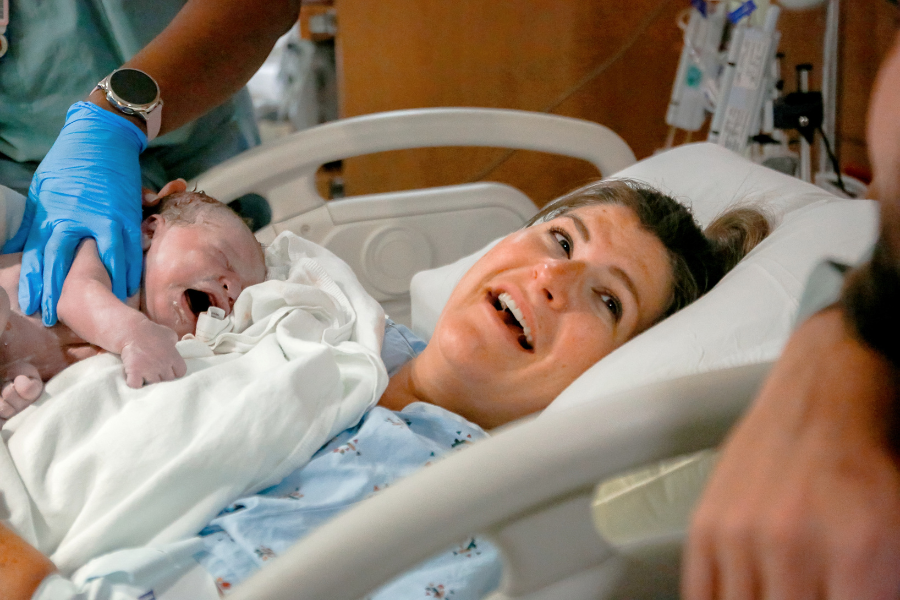Have you ever heard of the mask of pregnancy? I actually wouldn’t be surprised at all if this is completely unfamiliar to you!
It’s likely not a phrase you will hear from your OB provider, and I’m guessing not something that you and your girlfriends sit around discussing either.
But before you start thinking that the mask of pregnancy is a bad thing (because it’s not at all!) let’s talk about what the mask of pregnancy actually is!
Follow @mommy.labornurse on Instagram to join our community of over 650k for education, tips, and solidarity on all things pregnancy, birth, and postpartum!
What is the mask of pregnancy?
Maybe you are more familiar with the term “pregnancy glow”, which is a flushed or glowing look of the skin during pregnancy caused by all those crazy hormones.
This is one of the few hormonal perks that women might be fortunate enough to experience at some point during pregnancy.
Another hormone-related skin change that can occur during pregnancy is melasma, or the mask of pregnancy.
Instead of a lovely, refreshing glow, melasma appears as dark patches or spots on the face that sort of resemble sun spots. As with most things that occur during pregnancy, melasma should also go away after you give birth!
What causes the pregnancy mask?
I’ll give you one guess as to what causes the pregnancy mask. Ding, ding, ding…hormones! If your mom, grandmother, or anyone else in your family experienced melasma during their pregnancy, or you frequently sit in the sun without sunscreen, you definitely might increase your chances of getting it.
Just as we don’t know exactly why some pregnant women are more prone to experiencing morning sickness, food aversions, and other pregnancy symptoms, we also aren’t sure why some are at an increased risk for developing melasma.
Does melasma occur anywhere else during pregnancy?
Most commonly, melasma occurs on a woman’s face during pregnancy. You are likely to find it on the cheeks, nose, and forehead.
Some women might also notice it on their arms, neck, or back – especially if these areas experience frequent sun exposure without sunscreen.
How to prevent melasma during pregnancy
One of the best things you can do to prevent melasma during pregnancy is to stay out of the direct sun and/or use sun protection when you are in the sun.
Sun protection not only includes sunscreen, but also hats to help shade your face and neck. You might want to consider investing in some long-sleeve sun shirts if you anticipate having to be outside for extended periods of time too.
How to treat melasma during pregnancy
There is no current treatment for melasma, which is why it’s so important to take actionable steps to prevent it from developing in the first place.
Using appropriate sun protection is not just important during pregnancy either – it is an effective way to dramatically decrease your risk of developing skin cancer.
Melasma should eventually fade and go away on its own once you are no longer pregnant. The timeframe for how long this will take is going to be different for each person and even for each pregnancy, so just be patient.
Most often, it will resolve within a few months of giving birth.
Best products for melasma during pregnancy
Unfortunately, a lot of the products that are effective in treating melasma aren’t safe to use during pregnancy.
Certain face cleansers and moisturizers can actually irritate your skin, making melasma worse. For this reason, it’s best to stick to mild products when searching for face products while pregnant.
The products might even say “mild” on them, but you can also look for words and phrases such as fragrance-free, gentle, sensitive skin, dermatologist approved, and look at the list of ingredients in the product as well.
Both Cetaphil and CeraVe have gentle facial cleanser products…and, they won’t break the bank, either – a win-win!
The same information applies to makeup products during pregnancy. Products that are gentle and for sensitive skin are the ones you want to stick with, to avoid making the melasma worse.
Does melasma during pregnancy mean boy or girl?
Wives’ tales surrounding fertility, pregnancy, baby sex prediction, etc. have been around for ages!
And while there’s no scientific proof to back them, they can be a lot of fun to sift through to determine which held true for you.
View this post on Instagram
As you have learned from this article, melasma is primarily caused by hormone fluctuations that occur during pregnancy. Yeah, sun exposure can play a role and certain beauty products can aggravate or worsen it, but for the most part, it’s the hormones.
There are people that will say being pregnant with a girl baby will “steal your beauty”. This simply is in reference to any kind of acne development or unusual skin changes that might occur during pregnancy.
If this wives’ tale were true, then we would expect a mama experiencing melasma during pregnancy to be carrying a baby girl. And while a lot of women that develop melasma do end up delivering baby girls, a good amount of them also give birth to boys as well!
There is no correlation between melasma and the sex of your baby. Have some fun with the old wives’ tales, but don’t put too much stock in any of them, mama!
Related Reading: Old Wives’ Tales About Pregnancy (Including some that may be true!)
Let’s wrap up
So there you have it, everything (and more) you ever wanted to know about this skin condition that can develop during pregnancy.
Melasma is actually pretty common during pregnancy. It’s estimated that over 50% of women will experience some degree of melasma during their pregnancy. For some it might be pretty mild and barely noticeable, while others may experience more significant skin changes.
Fear no more though, melasma, much like most other nagging pregnancy symptoms, will usually resolve on its own within a few months after giving birth.
Cheers to an even better birth, mama!
To keep learning more about things that might happen to your body during pregnancy be sure to check out my resources below:





